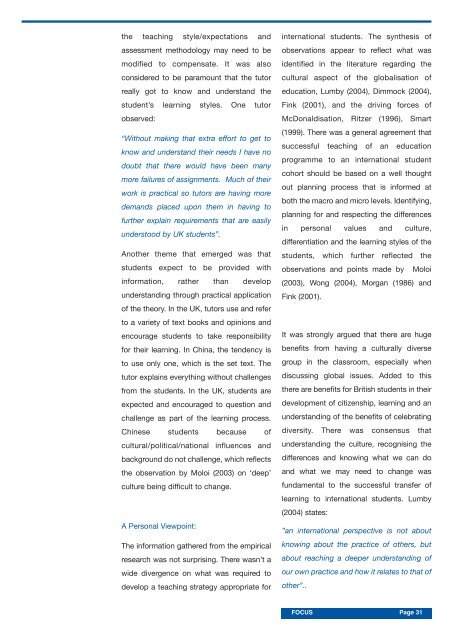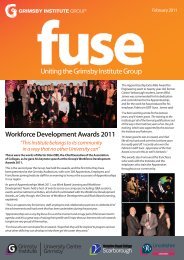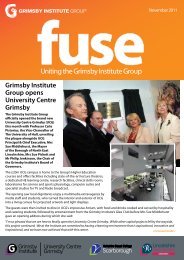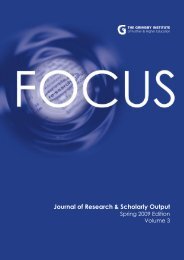Journal of Research & Scholarly Output 2006 - Grimsby Institute of ...
Journal of Research & Scholarly Output 2006 - Grimsby Institute of ...
Journal of Research & Scholarly Output 2006 - Grimsby Institute of ...
You also want an ePaper? Increase the reach of your titles
YUMPU automatically turns print PDFs into web optimized ePapers that Google loves.
the teaching style/expectations and<br />
assessment methodology may need to be<br />
modified to compensate. It was also<br />
considered to be paramount that the tutor<br />
really got to know and understand the<br />
student’s learning styles. One tutor<br />
observed:<br />
“Without making that extra effort to get to<br />
know and understand their needs I have no<br />
doubt that there would have been many<br />
more failures <strong>of</strong> assignments. Much <strong>of</strong> their<br />
work is practical so tutors are having more<br />
demands placed upon them in having to<br />
further explain requirements that are easily<br />
understood by UK students”.<br />
Another theme that emerged was that<br />
students expect to be provided with<br />
information, rather than develop<br />
understanding through practical application<br />
<strong>of</strong> the theory. In the UK, tutors use and refer<br />
to a variety <strong>of</strong> text books and opinions and<br />
encourage students to take responsibility<br />
for their learning. In China, the tendency is<br />
to use only one, which is the set text. The<br />
tutor explains everything without challenges<br />
from the students. In the UK, students are<br />
expected and encouraged to question and<br />
challenge as part <strong>of</strong> the learning process.<br />
Chinese students because <strong>of</strong><br />
cultural/political/national influences and<br />
background do not challenge, which reflects<br />
the observation by Moloi (2003) on ‘deep’<br />
culture being difficult to change.<br />
A Personal Viewpoint:<br />
The information gathered from the empirical<br />
research was not surprising. There wasn’t a<br />
wide divergence on what was required to<br />
develop a teaching strategy appropriate for<br />
international students. The synthesis <strong>of</strong><br />
observations appear to reflect what was<br />
identified in the literature regarding the<br />
cultural aspect <strong>of</strong> the globalisation <strong>of</strong><br />
education, Lumby (2004), Dimmock (2004),<br />
Fink (2001), and the driving forces <strong>of</strong><br />
McDonaldisation, Ritzer (1996), Smart<br />
(1999). There was a general agreement that<br />
successful teaching <strong>of</strong> an education<br />
programme to an international student<br />
cohort should be based on a well thought<br />
out planning process that is informed at<br />
both the macro and micro levels. Identifying,<br />
planning for and respecting the differences<br />
in personal values and culture,<br />
differentiation and the learning styles <strong>of</strong> the<br />
students, which further reflected the<br />
observations and points made by Moloi<br />
(2003), Wong (2004), Morgan (1986) and<br />
Fink (2001).<br />
It was strongly argued that there are huge<br />
benefits from having a culturally diverse<br />
group in the classroom, especially when<br />
discussing global issues. Added to this<br />
there are benefits for British students in their<br />
development <strong>of</strong> citizenship, learning and an<br />
understanding <strong>of</strong> the benefits <strong>of</strong> celebrating<br />
diversity. There was consensus that<br />
understanding the culture, recognising the<br />
differences and knowing what we can do<br />
and what we may need to change was<br />
fundamental to the successful transfer <strong>of</strong><br />
learning to international students. Lumby<br />
(2004) states:<br />
”an international perspective is not about<br />
knowing about the practice <strong>of</strong> others, but<br />
about reaching a deeper understanding <strong>of</strong><br />
our own practice and how it relates to that <strong>of</strong><br />
other”..<br />
FOCUS Page Page 31

















